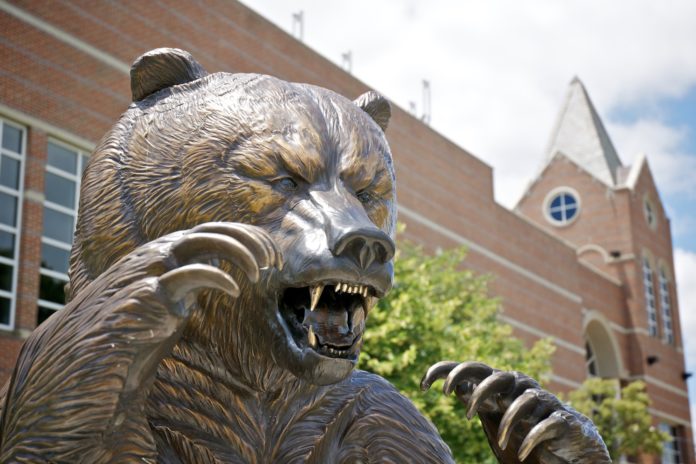The College of Liberal Arts saw four longtime professors retire at the conclusion of the spring semester. The four professors are Joanna Watson from sociology, Dr. Randall Peters from physics and Dr. James Radiker and Dr. John Wright, from psychology.
Watson arrived in Macon in 1972 and began teaching in the Sociology and Anthropology Department at Mercer. She worked in the classroom until 1978 when Dr. R. Kirby Godsey, former president of the University, asked her to start the first adult evening degree program. Watson served as the dean of the College for Working Adults, now the College of Continuing and Professional Studies.
Watson founded the Mercer Women’s Center in the early 1980s. The group came to fruition out of necessity when women started coming back to school by a three to one ratio over men. Watson gathered 30 influential Macon women to serve as the board and work towards two specific goals: scholarship funding for non-traditional women returning to school and creating and implementing workshops that would supplement the needs of the group members. In 1995, Watson went back to teaching in the classroom.
“When students and the outside world meet each other, it’s remarkable,” said Watson. “President Nixon’s first public appearance after the Watergate scandal was at Mercer University, where he dedicated a ship to a congressman from Georgia. Nixon wanted a place where protesting was at a minimum. Mercer’s Theatre production of Oedipus was taking place at this time and the cast was walking across the quad in full regalia for a dress rehearsal, the Secret Service had no idea what was going on . . . it was a true sight to see them question Oedipus the King, worried that this troop had ill intention for the president when, in actuality, they were just acting as normal students.”
Watson’s retirement will allow her to continue civic involvement as the president of the Georgia Children’s Home and as a board member for Meals on Wheels. She will remain committed to archeological endeavors through continued travels to Israel, Greece and Mexico among many others.
Dr. Wright, like Watson, has had a significant impact on Mercer. He valued his work because of “the satisfaction of involving students in the process of doing research.” His identity as a teacher and scholar were always fused in valuable ways.
“We’re trying to be progressive, never stale, never looking back,” said Dr. Wright. “We look at data and see where it’s pointing.”
Dr. Wright’s passion for the education and the betterment of his students continues. “At Mercer, we care about our students,” he said. He will take with him the memories of the pleasure he found in sharing in the successes of his students.
Dr. Wright is a pioneer and nationally recognized in the field of animal behavior. He has twice served as chairman of the Animal Behavior Society’s Board of Professional Certification (including its inaugural chair) and has been on the Council of Directors for The Cat Writer’s Association. Dr. Wright is co-founder and organizer of the Interdisciplinary Forum for Applied Animal Behavior and continues to serve on the editorial board for the Journal of Applied Animal Welfare Science. Dr. Wright wrote three critically acclaimed books titled “Ain’t Misbehavin’: The Groundbreaking Program for Happy Well-Behaved Pets and Their People,” “Is Your Cat Crazy? Solutions from the Casebook of a Cat Therapist” and “The Dog Who Would Be King.”
“Mercer has allowed me to do so much and I am very grateful for that,” Dr. Wright said. “So many doors are present in my life right now, it’s just a matter of which I choose to open and go through that lies before me.”
Dr. Peters is also a man of many achievements. He believes his best work at Mercer was that which “involved students directly, or which have focused specifically on pedagogy, or the ‘common good’ to which Mercer is highly devoted.” He looks back with great pride on his work at Mercer and especially the successes of his students.
As a scholar, Dr. Peters published numerous papers and articles throughout his career. He also pioneered several inventions, which he hopes to continue working on in his retirement.
“I will be working on commercialized physics laboratory equipment designs that I created in years past and which can now be improved through new digital technologies,” Dr. Peters said. He also hopes to design and build an affordable seismograph, a project he has envisioned in 2004 following the terrible loss of life caused by the Banda Aceh earthquake and the tsunami it created.
Dr. Radiker looked back on his time at Mercer, before the technologies that mark today’s environment and the vast changes that have made the University and society a different place.
“When I started teaching in 1974 there were no personal computers, no cell phones and no Facebook,” he said. “At Mercer, there was no medical school, engineering school, or University Center. What Mercer did have, and what has remained constant, was good students and dedicated faculty members. Certainly the most gratifying experience one can have as a teacher is to see one’s students go on to have successful lives and careers.”
Dr. Radiker served at Mercer long enough to see two of his students return as professors themselves: Dr. Charlie Thomas, in philosophy and Dr. Bo Shippen, formerly in the Eugene W. Stetson School of Business and Economics.
“I’m looking forward to having more time for gardening, birding, and travel as well as reading all of the books I’ve been saving for when I retired,” he said. “I would love to hear from former students via the Facebook group for psychology alumni we recently started,” he said. “Nothing warms an old professor’s heart more than hearing from former students.”










